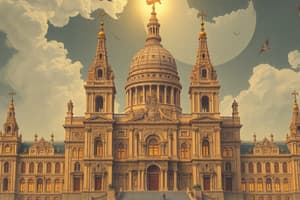Podcast
Questions and Answers
Which type of polity involves governance by a single ruler?
Which type of polity involves governance by a single ruler?
- Democracy
- Monarchy (correct)
- Theocracy
- Oligarchy
What is meant by political sovereignty?
What is meant by political sovereignty?
- Involvement of citizens in political activities
- The acceptance of a government by the citizens
- Ultimate authority within a territory (correct)
- Ability to influence foreign policies
Which of the following is NOT a feature of totalitarianism?
Which of the following is NOT a feature of totalitarianism?
- Limited political freedoms
- Control over all aspects of life
- Emphasis on individual rights (correct)
- Centralized control by a single authority
What type of political system divides powers between national and local governments?
What type of political system divides powers between national and local governments?
Which type of polity allows citizens to vote directly on laws?
Which type of polity allows citizens to vote directly on laws?
What is a common challenge faced by political systems?
What is a common challenge faced by political systems?
Authoritarianism is characterized by which of the following?
Authoritarianism is characterized by which of the following?
What defines an oligarchy as a form of governance?
What defines an oligarchy as a form of governance?
Flashcards are hidden until you start studying
Study Notes
Definition of Polity
- Polity refers to a political organization or system of governance.
- It can denote any form of political entity, including states, governments, and institutions.
Types of Polity
-
Monarchy
- Governance by a single ruler (king or queen).
- Types: Absolute (unlimited power) and Constitutional (limited power by law).
-
Democracy
- Rule by the people, typically through elected representatives.
- Types: Direct (citizens vote on laws directly) and Representative (citizens elect representatives to make decisions).
-
Oligarchy
- Rule by a small group of people, often determined by wealth, family ties, or military control.
-
Theocracy
- Governance by religious leaders or based on religious laws.
-
Authoritarianism
- Centralized control by a single authority or party with limited political freedoms.
-
Totalitarianism
- An extreme form of authoritarianism, where the state seeks to control all aspects of public and private life.
Key Concepts
- Sovereignty: Ultimate authority within a territory.
- Legitimacy: Acceptance and recognition of a government’s authority by the governed.
- Political Participation: Involvement of citizens in political processes; can include voting, activism, and running for office.
Functions of Polity
- Law Making: Establishing and enforcing laws.
- Public Services: Providing services such as education, healthcare, and infrastructure.
- Stability and Security: Maintaining order and protecting citizens from threats.
- Representation: Reflecting the diverse interests of the populace.
Political Systems
- Unitary System: Centralized government where local governments derive authority from the central government.
- Federal System: Division of powers between national and local governments.
- Confederation: A union of sovereign groups or states united for purposes of common action.
Challenges in Polity
- Corruption: Abuse of power for personal gain, undermining political integrity.
- Political Polarization: Deep divisions in politics that can lead to instability and conflict.
- Human Rights Violations: Abuse of individual rights, often associated with authoritarian regimes.
The Role of Political Culture
- Beliefs and Values: Collective attitudes influencing governance and political behavior.
- Socialization: Process by which individuals acquire political culture through family, education, and media.
Evolution of Polity
- Historical changes in governance structures, from feudal systems to modern democracies.
- Influence of revolutions, reforms, and globalization on political systems.
Polity: A Definition
- A political organization or system of governance encompassing states, governments, and institutions
- Can be categorized by the distribution of power, influence, and decision-making processes
Types of Polity
- Monarchy: Ruled by a single individual, often hereditary (e.g., king or queen)
- Absolute monarchy: Ruler holds unlimited power
- Constitutional monarchy: Ruler's power is limited by a constitution or law
- Democracy: Power resides in the people, typically through elected representatives
- Direct democracy: Citizens participate directly in decision-making through voting
- Representative democracy: Citizens elect representatives to make decisions on their behalf
- Oligarchy: Rule by a small, elite group, often based on wealth, family, or military control
- Theocracy: Governance by religious leaders or based on religious laws
- Authoritarianism: Centralized control by a single authority or party with limited political freedom
- Totalitarianism: Extreme form of authoritarianism, where the state seeks control over all aspects of public and private life
Key Concepts in Polity
- Sovereignty: The supreme authority within a territory
- Legitimacy: The acceptance and recognition of a government's authority by the governed
- Political participation: Citizens' involvement in the political process, including voting, activism, and running for office
Functions of Polity
- Law making: Establishment and enforcement of laws
- Public service provision: Delivering essential services like education, healthcare, and infrastructure
- Stability and security: Maintaining order and protecting citizens from threats
- Representation: Reflecting the diverse interests of the populace
Political Systems
- Unitary: Centralized government where local governments derive authority from the central government
- Federal: Power is divided between a national government and local governments
- Confederation: A union of independent states or entities united for common purpose with limited central authority
Challenges in Polity
- Corruption: Abuse of power for personal gain, undermining political integrity
- Political polarization: Deep divisions in political views leading to instability and conflict
- Human rights violations: Abuse of individual rights, often associated with authoritarian regimes
Political Culture
- Beliefs and values: Collective attitudes that shape governance and political behavior
- Socialization: Process of acquiring political culture through family, education, and media
Evolution of Polity
- Historical changes in governance structures, from ancient feudal systems to modern democracies
- Influence of revolutions, reforms, and globalization on political systems.
Studying That Suits You
Use AI to generate personalized quizzes and flashcards to suit your learning preferences.




